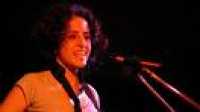On her first eponymous album from 2002, Fernanda Porto elegantly mixed electronica (mostly drum'n'bass) with more traditional Brazilian popular music styles such as bossa nova, maracatu, and samba. The fact that she put much thought and effort into the lyrics (she also set poems to music) strengthened the already sophisticated air of her unusual brand of drum'n'bass. The album was widely lauded by the critics and was also a commercial success in Brazil. This prompted the Trama record label to release the album internationally about a year later, and Porto also went on a promotional tour through Europe, the U.S., and Japan.
Having her first album released when she was already well over 30 years old made it seem like Porto's musical talent sprung up virtually from nowhere. That isn't quite the case, though. When in her twenties, Porto studied music at the University of São Paulo, specializing in piano, and during the '90s she composed songs and performed regularly on various stages around São Paulo and Brazil. She also composed the soundtracks of a couple of movies.
Porto's second album, Giramundo, was released in December 2004 and confirmed her status as one of the most talented artists of the Brazilian pop scene. Giramundo had a less electronic and more organic sound, which Porto herself described as "acoustic drum'n'bass," and which also incorporated elements of rock. Working with her on this album were bassist Doug Wimbish and drummer Will Calhoun from the American rock band Living Colour. The most prominent guest artist on the album, however, was Chico Buarque, who lent his voice to "Roda Viva" (one of his own compositions), which Porto had turned in to a rather frenetic drum'n'bass tune. That version of "Roda Viva," plus two other interpretations of Buarque songs, would also appear on Porto's soundtrack to the film Cabra Cega by Toni Venturi. ~ Philip Jandovský, All Music Guide Written by Philip Jandovský
Source: http://nz.music.yahoo.com/ar-307869-bio--Fernanda-Porto
